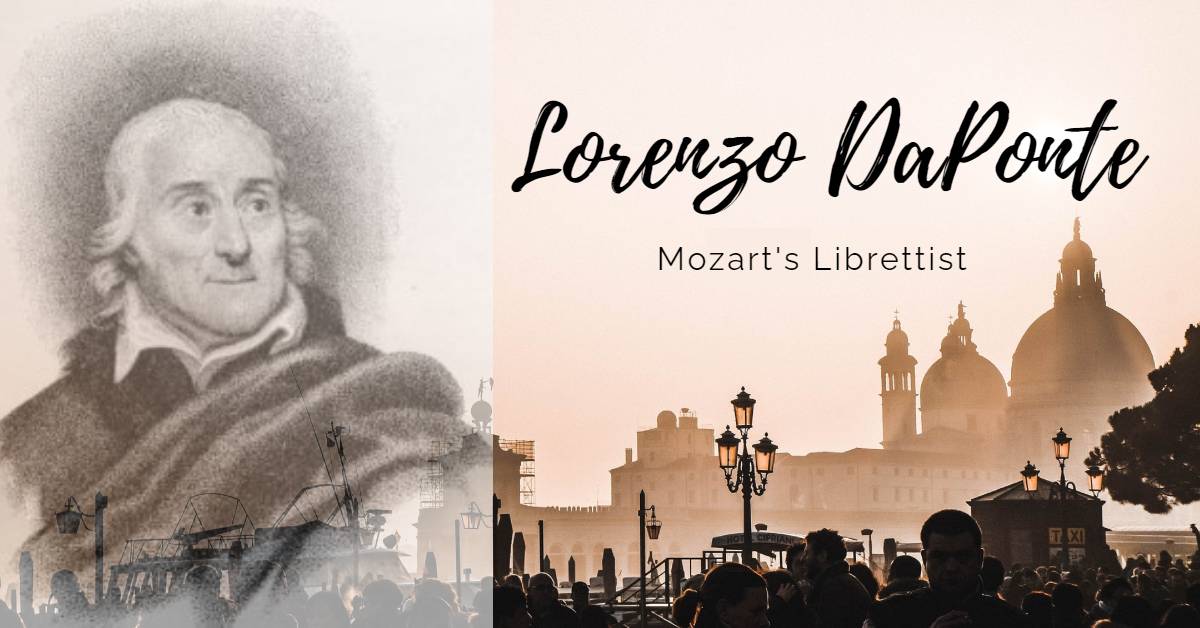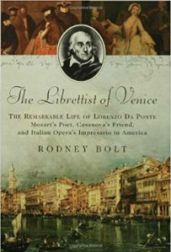Not often mentioned with the same reverence as the composer, the work of a librettist is no less important to a genre which, from its inception, sought to combine the magical forces of music and drama to create something greater than the sum of its parts.
While Mozart is the very definition of a household name (even among folks who can’t even name one of his works), his most successful collaborator is all-but-unknown to those who are not ardent opera fans. The Venetian writer, Lorenzo Da Ponte, wrote the libretti for three of Mozart’s most celebrated operas; The Marriage of Figaro, Don Giovanni, and Cosi Fan Tutte. And yet you may have never heard of him.
The Life of Lorenzo Da Ponte
Born in the Jewish ghetto of Venice, Lorenzo converted to Christianity as a youth when his widower father married a Catholic woman. Emboldened by an opportunity not yet given to Jews, he entered the priesthood to have access to higher education.
But while a priest in name, he often “overlooked” the vows of his order to compete with his good friend Giacomo Casanova (yes, THAT Casanova) for being the most scandalous scoundrel in all of Venice. He allegedly lived in a brothel and organized “entertainment” there for himself and other gentlemen of Venetian society on a regular basis.
Eventually he was arrested, convicted, and banished from the city for “public concubinage” and “abduction of a respectable woman.” The “respectable woman” in question was probably the mistress with whom he, the ordained priest, had two children.
So perhaps he knew what he was talking about from first-hand experience when he wrote the (in)famous “Catalog Song” from Don Giovanni, in which the title character’s servant lists the number of women his master has seduced:
In Italy six hundred and forty; in Germany, two hundred and thirty-one. A hundred in France, in Turkey ninety-one, but in Spain already a thousand three!
Exile from Venice brought him to Vienna and to the court of Emperor Joseph II, who had just created an Italian opera company. There Da Ponte coaxed his way into the role of “theater poet” without ever having written an opera in his entire life.
But it was in Vienna that Da Ponte first encountered Wolfgang Amadeus Mozart. They were both living near the Stephansplatz at the time, neighbors in one of Vienna’s most trendy quarters. While collaborating on Le nozze di Figaro during a six week period in 1786, they scampered back and forth between Da Ponte’s humble abode and Mozart’s’ opulent apartments.
According to The Librettist of Venice, by Rodney Bolt:
“We do not know the full extent of that back-and-forth across the Stephansplatz, of how much composer and librettist argued, of whose ideas shaped what, but it is clear that as Da Ponte delivered page after page of prose drama transfigured into poetry that sang in itself, and a form that would be effective as opera, Mozart was able to take the pragmatically simplified plot and re-endow the characters with subtlety, providing an audible commentary, one moment sarcastic, the next touching, then deliciously witty.”
“And so the simple conversation between Susanna and the Countess, as they compose a letter to entrap the Count, became a duet of extraordinary sweetness and intimacy; Susanna’s aria ‘Deh vieni‘, when pretending to be waiting for a tryst with the Count, intertwined her aim to teach Figaro a lesson for doubting her with a heartfelt expression of desire — a genuine hymn to love in a stock scene of buffo deception. The music-infused the characters that the words had conjured up with the contradictions, doubts, ironies, and warmth of richer humanity.”
Da Ponte’s American Career
In the United States, Da Ponte settled in New York City and became the first professor of Italian literature at Columbia College. While living in New York he produced the first full performance of Don Giovanni in the United States.
In 1828, at the age of 79, Lorenzo Da Ponte became a naturalized U.S. citizen. Five years later he founded an opera house in the United States, called “The New York Opera Company.” Sadly, due to an acute lack of business savvy, Da Ponte’s opera house lasted only two seasons. However, it paved the way for the New York Academy of Music and the New York Metropolitan Opera.
Lorenzo Da Ponte died in 1838 in New York. In 2009, the Spanish director Carlos Saura released a film in Italian called Io, Don Giovanni, a “half fact, half fiction” account of Mozart’s librettist, which attempted to parallel his life with his most famous libretto, Don Giovanni.


